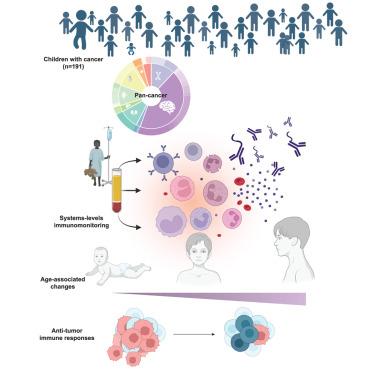Systems-level immunomonitoring in children with solid tumors to enable precision medicine
IF 45.5
1区 生物学
Q1 BIOCHEMISTRY & MOLECULAR BIOLOGY
引用次数: 0
Abstract
Cancer is the leading cause of death from disease in children. Survival depends not only on surgery, cytostatic drugs, and radiation but also on systemic immune responses. Factors influencing these immune responses in children of different ages and tumor types are unknown. Novel immunotherapies can enhance anti-tumor immune responses, but few children have benefited, and markers of effective responses are lacking. Here, we present a systems-level analysis of immune responses in 191 children within a population-based cohort with diverse tumors and reveal that age and tumor type shape immune responses differently. Systemic inflammation and cytotoxic T cell responses correlate with tumor mutation rates and immune cell infiltration. Clonally expanded T cell responses are rarely detected in blood or tumors at diagnosis but are sometimes elicited during treatment. Expanded T cells are similarly regulated in children and adults with more immunogenic cancers. This research aims to facilitate the development of precision immunotherapies for children with cancer.

儿童实体瘤的系统级免疫监测使精准医疗成为可能
癌症是儿童疾病死亡的主要原因。生存不仅取决于手术、细胞抑制药物和放疗,还取决于全身免疫反应。在不同年龄和肿瘤类型的儿童中影响这些免疫反应的因素尚不清楚。新的免疫疗法可以增强抗肿瘤免疫反应,但很少有儿童受益,而且缺乏有效反应的标志物。在这里,我们对191名患有不同肿瘤的儿童的免疫反应进行了系统水平的分析,并揭示了年龄和肿瘤类型对免疫反应的影响不同。全身性炎症和细胞毒性T细胞反应与肿瘤突变率和免疫细胞浸润相关。克隆扩增T细胞反应在诊断时很少在血液或肿瘤中检测到,但有时在治疗过程中会引起。扩增的T细胞在患有更多免疫原性癌症的儿童和成人中也受到类似的调节。这项研究旨在促进癌症儿童精确免疫疗法的发展。
本文章由计算机程序翻译,如有差异,请以英文原文为准。
求助全文
约1分钟内获得全文
求助全文
来源期刊

Cell
生物-生化与分子生物学
CiteScore
110.00
自引率
0.80%
发文量
396
审稿时长
2 months
期刊介绍:
Cells is an international, peer-reviewed, open access journal that focuses on cell biology, molecular biology, and biophysics. It is affiliated with several societies, including the Spanish Society for Biochemistry and Molecular Biology (SEBBM), Nordic Autophagy Society (NAS), Spanish Society of Hematology and Hemotherapy (SEHH), and Society for Regenerative Medicine (Russian Federation) (RPO).
The journal publishes research findings of significant importance in various areas of experimental biology, such as cell biology, molecular biology, neuroscience, immunology, virology, microbiology, cancer, human genetics, systems biology, signaling, and disease mechanisms and therapeutics. The primary criterion for considering papers is whether the results contribute to significant conceptual advances or raise thought-provoking questions and hypotheses related to interesting and important biological inquiries.
In addition to primary research articles presented in four formats, Cells also features review and opinion articles in its "leading edge" section, discussing recent research advancements and topics of interest to its wide readership.
 求助内容:
求助内容: 应助结果提醒方式:
应助结果提醒方式:


